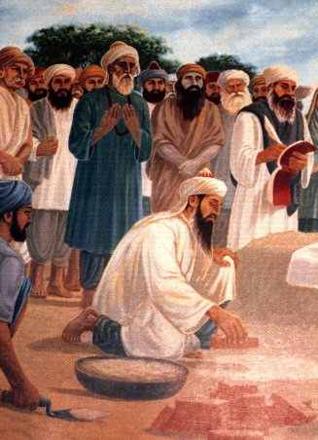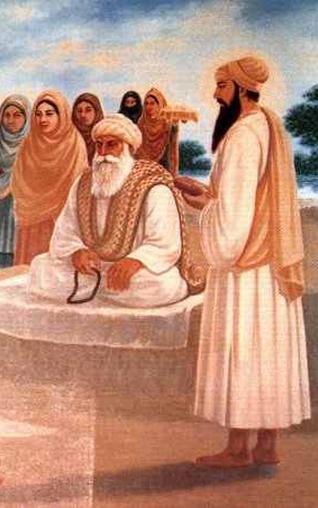
Images: Details from an artist's rendition. Above - Saa-ee(n) Mian Mir lays the foundation of the Harmandar Sahib. Below, Baba Buddha (seated) and Guru Arjan look on.

An Interfaith Eye-Opener:
Sikhs & Muslims
by DYLAN KAPLAN
The large Sikh men with long white beards played the tabla drums. Sikh men with red, blue, and orange colored turbans sat cross-legged in all corners of the sanctuary. Women dressed in bold blue, green, and purple Punjabi suits sat consumed in prayer.
As I sat on the red carpet among the 300-400 guests in the audience with my hair covered in an orange cloth and my feet crossed I could not help but realize the significance of this moment as the Sikh prayers seemed to float towards me and consumed me. I had to constantly remind myself that I was in a gurdwara, not in distant Punjab, but in Rockville, Maryland, U.S.A.
On Sunday, November 13, 2011, I had the privilege of attending the Sikh high-holiday honoring Guru Nanak, the revered founder of Sikhism. My mentor, Ambassador Akbar Ahmed, whom the BBC calls “the world’s leading authority on contemporary Islam”, was invited by the Sikh community to give the keynote address.
This was the first time, I was told, a Muslim would be addressing this particular congregation.
Ambassador Ahmed spoke about religious pluralism and tolerance and the need for Muslims and Sikhs to live at peace. The ambassador explained that through Guru Nanak’s life we “learn how he promoted the dialogue between the two great religions of India, Hinduism and Islam, which added to the beauty and birth of Sikhism.”
Ahmed quoted one of his favorite sayings of Guru Nanak: “When I give myself to thee, O Lord, the whole world is mine.” He also spoke of the great Sufi Islamic saint, Mian Mir, who, in an act of religious pluralism, was invited by Guru Arjan - the Fifth Sikh Master - to lay the foundation stone at the Golden Temple, the Mecca and Jersusalem of Sikhism.
Ahmed reminded us about the pain of Partition when in 1947 Punjab was divided and two new countries, India and Pakistan, were created. He urged that the healing process should begin.
When Ambassador Ahmed finished, Dr. Rajwant Singh, Chairman of the Sikh Council on Religion and Education, said: “My heart was pounding with the power of his words” and that Ambassador Ahmed’s message was very important for the entire South Asian community.
Later Manjula Kumar, a Hindu and a director at the Smithsonian institute, wrote that Ahmed was “creating history … I have never had such a wonderful experience at any gurdwara”.
We also met White House representative Tuyet G. Duong. She spoke about the Obama administration’s desire to strengthen the relationship between the White House and the Sikh community. She told us about the similarities she found in her own Buddhist faith to Sikhism. We also met Dr. Nisar Chaudhury, the president of the Pakistan American league , who was visiting his first gurdwara and was thrilled.
We were also introduced to Sardar Harcharan Singh Brar, who is head of the Mian Mir foundation in Amritsar. This is the equivalent of an Israeli Jew leading a foundation whose namesake is a Palestinian Muslim. I left the event feeling confident that if Muslims and Sikhs can be friends that Muslims and Jews can be too.
As an American University college student and undergraduate senator, I represent roughly 6,000 students in the American University student government. My university is a unique place where my constituency comprises of students of all backgrounds and faiths. I live in a community where I can have pro-Israel Jewish friends and Muslim Palestinian friends. However, to witness such a degree of commitment to religious pluralism as was shown at the gurdwara was very moving.
Interfaith dialogue is a challenging enterprise at this time of widespread Islamophobia, prejudice, and with a media that often increases misunderstanding between people.
The event at the gurdwara exemplified the genius of Franklin, Jefferson, and Washington, the American founding fathers. The event showed American religious pluralism in live action. As a Jewish American college student from Bethesda, Maryland it was an unusual situation to be in a gurdwara with a Pakistani Muslim, who was the former Ambassador from Pakistan to the United Kingdom.
In how many countries can a Buddhist, Hindu, Jew, Muslim, and Sikh pray and eat peacefully together? How many countries in the world have a Sikh community that is so committed to bringing different people together that they would invite a Pakistani Muslim to speak on their most religious holiday? The founding fathers would have been pleased to see that their dream of a religiously pluralistic America is still of the utmost importance in their own country today.
Dylan Kaplan is currently studying at American University and is a senator representing the undergraduate student body.
[Courtesy: The Washington Post. Edited for sikhchic.com]
November 25, 2011
Conversation about this article
1: Baldev Singh (Bradford, United Kingdom), November 25, 2011, 10:03 PM.
Pakistanis are very much aware of Guru Nanak's words despite what their Islamic clergy tells them to believe.
2: Sangat Singh (Kuala Lumpur, Malaysia), November 26, 2011, 6:07 AM.
Dr. Mohamed Iqbal, one of the most famous poets of Punjab, was full of devotion, love and respect for Guru Nanak. He writes at one place that the advent of Guru Nanak was of the same importance as that of prophet Ibrahim (Abraham) who came into this world 5000 years ago. He writes that Guru Nanak was such a divine power that with his love he used to enchant people of various religions, nations and castes. People couldn't resist him. And the outcome of this was that they used to follow his teachings. He was such a majestic personality. To be honest and truthful was Guru Nanak's advice. He used to preach his followers to be truthful. Sayyad Habib Shah who has studied different religions was a very good friend of Mohammad Iqbal. Habib became deeply influenced by Guru Nanak's bani, Japji Sahib. He decided to translate this bani for the betterment of humanity. When his friend Iqbal came to know about his plan, he immediately sent a telegram to Habib, cautioning him to be just and righteous while translating the sacred bani. He writes in his telegram, "Habib, ask God to give you strength to be honest and just while translating Guru Nanak's Japji Sahib in Urdu. Be neutral while translating it because this has been penned by the great creator Guru Nanak. And the way Guru Nanak has served Islam is remarkable and unrivalled.
3: Aryeh Leib (Israel), November 28, 2011, 4:57 PM.
"I left the event feeling confident that if Muslims and Sikhs can be friends that Muslims and Jews can be too." The fact is that there are individual Muslims and Jews who are friends - contrary to what the article seems to suggest. What bothers me is the sweeping generality of the statement. Any religion, nation, ethnicity, etc., is necessarily composed of individuals. Some are blessed with a universalist bent, others are not. This appears to be so regardless of what the religion or secular philosophy itself professes; people will always interpret to suit their own perceived interests, usually citing scripture for support. I believe it really comes down to one-on-one relationships forming a paradigm by which to relate to the more distant (and therefore more impersonal) group ethos of "Them" versus "Us", which is responsible for so much societal strife. If I'm not mistaken, this is what the Guru is telling us in every context.
4: Amrita (Birmingham, United Kingdom), December 05, 2011, 8:24 AM.
Glad that both Sikhs and Muslims are becoming more aware of the various aspects of the origins of their respective religions. E.g., that Guru Nanak visited Mecca. When the Guru and his friend stopped to rest for the night, the Guru fell asleep, pointing his feet towards Mecca. But when corrected, he pointed out that God was everywhere, and the Muslims understood. I dislike how some religions are told to hate other religions, or stay way from "them". But Ik-Oankar! By the way this is an 11-year old talking! Religions, all! Worship One God !


